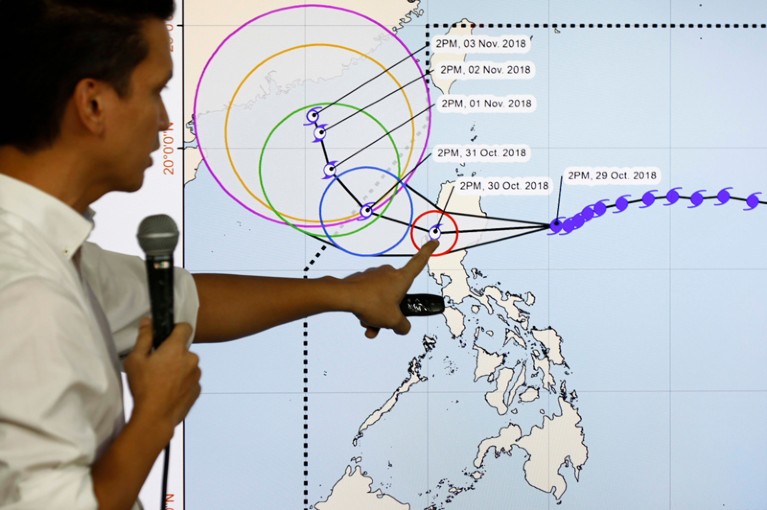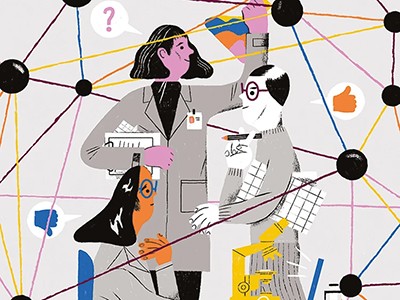
AI tools are being used in weather forecasting, such as to track Typhoon Yutu off the coast of the Philippines in 2018.Credit: Rolex Dela Pena/EPA-EFE/Shutterstock
The number of research fields touched by artificial intelligence (AI) is rising all the time. From protein folding to weather forecasting, and from medical diagnostics to science communication, the list seems to grow by the day. The proportion of papers in the Scopus database that mention AI or AI-related keywords in the title or abstract now stands at 8%, up from 2% a decade ago, according to an analysis by Nature.
Meanwhile, AI has also been changing. Whereas the 2010s saw a boom in the development of machine-learning algorithms that can help to discern patterns in huge, complex scientific data sets, the 2020s have ushered in a new age of generative AI tools pre-trained on vast data sets that have much more transformative potential.
Science and the new age of AI: a Nature special
But precisely how and why AI in its various forms is affecting science — and, indeed, whether or how all of the purported benefits will be realized — is itself an emerging story. A Nature survey has captured the views of more than 1,600 researchers from around the world. It marks the launch of a new series on the role of AI in science. We intend to draw on these results as we dive deeper into what researchers are saying about AI and so inform the conversation about the technology’s potential — and its pitfalls. All of the material in Nature’s series will be accessible on one website (see go.nature.com/3jz1uvw).
Survey respondents told us, for example, that they are using AI to process data, write code and help them write papers. One clear benefit for many is in English-language science communication. Generative-AI tools powered by large language models (LLMs), notably ChatGPT, help researchers whose first language is not English, but who need to use English to publish their research. Scientists can use LLMs to improve their writing style and grammar, and to translate and summarize other people’s work.
AI is also widely being used in science education around the world. Students at schools and universities regularly use LLM tools to answer questions, and teachers are starting to recognize that curricula and methods of pedagogy will need to change to take this into account.
But respondents also reported concerns, many of which mirror those held in wider society about AI technologies. These range from the lack of transparency of ‘black box’ systems, in which the underlying reasons why an AI reaches the results it does are not clear, to fears over training data including biased information. Researchers are also concerned about the harms that could be caused by AI spreading misinformation, and the prospect of AI-generated fake studies. These concerns hold particular weight in science. If we lose trust in primary scientific literature, we have lost the basis of humanity’s corpus of common shared knowledge.
AI and science: what 1,600 researchers think
Another factor that survey respondents commented on is the dominant part corporations are playing in the development of AI. Companies are valuable contributors to science, technology and innovation. But the scale of their ownership of AI, in terms of both the technology and the human data needed to power it, is greater than in the past. Researchers need access to data, code and metadata. Producers of black-box systems need to recognize the necessity of making these available for research if AI claims are to pass verification and reproducibility tests. But the speed at which AI is developing means regulators are still playing catch-up.
In the coming weeks and months, we will be further exploring these and other questions about the influence of AI on science, including how AI will affect scientific publishing, and whether, for example, peer reviewers need to be trained to identify the use of AI in studies.
Now is the time to determine which aspects of research and society AI can be safely integrated into, and how to go about it. The coming deluge of AI-powered information must not be allowed to fuel a flood of untrustworthy science. Science and humanity stand to benefit from AI, provided it is applied in the right way. A comprehensive understanding of the potential dangers of this technology is an essential prerequisite for its safe use.

 Science and the new age of AI: a Nature special
Science and the new age of AI: a Nature special
 AI and science: what 1,600 researchers think
AI and science: what 1,600 researchers think
 AI tools as science policy advisers? The potential and the pitfalls
AI tools as science policy advisers? The potential and the pitfalls
 How to stop AI deepfakes from sinking society — and science
How to stop AI deepfakes from sinking society — and science
 ChatGPT is a black box: how AI research can break it open
ChatGPT is a black box: how AI research can break it open
 ChatGPT broke the Turing test — the race is on for new ways to assess AI
ChatGPT broke the Turing test — the race is on for new ways to assess AI
 ChatGPT: five priorities for research
ChatGPT: five priorities for research
 Stop talking about tomorrow’s AI doomsday when AI poses risks today
Stop talking about tomorrow’s AI doomsday when AI poses risks today







